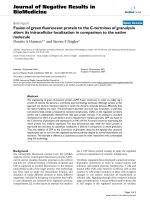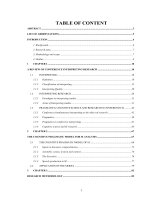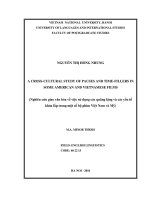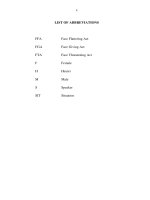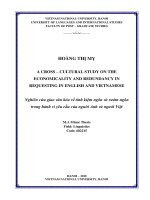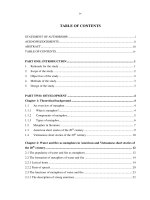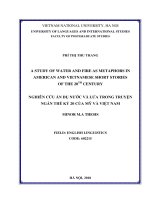Idioms with as as in comparison with the vietnamese ones = nghiên cứu thành ngữ so sánh trong tiếng anh và tiếng việt
Bạn đang xem bản rút gọn của tài liệu. Xem và tải ngay bản đầy đủ của tài liệu tại đây (375.71 KB, 32 trang )
1
Graduation thesis
Part A: Introduction
1. Rationale
As we know, English is used the most widely over the world. As a result,
English is being taught and learned in Vietnam. During the course of English, we
have chance to deal with many aspects of English language. We are really fond of
English idioms since they play a very important role in reflecting the vivid,
colourful picture of nation’s customs, cultural traditions and history. Idioms are
used both in written and spoken language to emphasize meaning and make our
observation, judgment and explanations are more lively and interesting
(Longman, idioms dictionary); so, they have aesthetic function. In other words,
they are really useful tools for communicating of great deal of meaning in just a
few words. For example, to indicate a person who is really beautiful, the English
men are likely to say as beautiful as the rainbow or as beautiful as the sunset. To
indicate a person who is very fat, Vietnamese would like to say bÐo nh con cun
cót (as fat as a partridge). We are attracted by the question how and why idioms
differ from each other between English and Vietnamese in case of comparative
idioms with as...as referring to people.
Hence, there are many researchers, many linguists studying about idioms
such as Peter Howard (English vocabulary aid), Xuân Bá, Trần Thanh Sơn,
Nguyễn Đình Hùng....They give lists of English idioms and their uses or the
explanations. However, they have not mentioned much
the similarities and
differences between English and Vietnamese idioms. Especially, for comparative
idioms with as.... as, they only give lists of these kinds of idioms without
explanation and comparison with Vietnamese.
Furthermore, as a student of English, I find that students of English only
stop at using non - idiomatic ways of expressing ideas. There are a few students
Lê Thị Thuý – 42A2
2
Graduation thesis
using idioms in their speaking and writing. It means students of English miss the
chance to reach the highest effect in communication in general and in
communication with foreigners in particular. If they try consciously to fill their
speech and writing with idioms, the effect will probably be improved.
For all the reasons above, we decide to choose to study about Idioms with
“as...as referring to people in comparison with the Vietnamese ones. I hope the
study can partly improve the knowledge of idioms in students of English. In this
study, idioms are described in a variety of contexts and situations. English idioms
are various and prosperous, especially about people. Thus, in this small scale of the
study, we only deal with comparative idioms with as...as about the appearance,
character, mental state, and health state in comparison with the Vietnamese ones.
2. Aims of the study
The first aim of this study is to help the learners to improve their knowledge
of English and Vietnamese idioms as well, especially comparative idioms with
as...as referring to people.
The second aim of the study is to give students and learners some identities
in culture, customs, and traditions of the two countries which are described in
comparative idioms with as...as referring to people.
The third aim is that through this study, we give some suggestions for
learning and teaching idioms and some types of exercises to improve the ability to
use comparative idioms with as...as referring to people.
3. Scope of the study
- Idioms
- Comparative idioms with as...as referring to people in English and
Vietnamese.
Lê Thị Thuý 42A2
3
Graduation thesis
- The meaning of English comparative idioms with as...as referring to
people and their equivalents in Vietnamese.
4. Methods of the study
- Statistic method
- Contrastive and comparative method
- Analytic and synthetic method
5. Design of the study
Part A: Introduction
1. Rationale
2. Aims of the study
3. Scope of the study
4. Methods of the study
5. Design of the study
Part B: Investigation
Chapter 1: Idioms
Chapter 2: Idioms with as...as referring to people in comparison with the
Vietnamese ones.
Chapter 3: Some suggestions for learning and teaching idioms and some
suggested exercises for using idioms with as...as referring to people
Part C: Conclusion
References
Appendix
Lê Thị Thuý 42A2
4
Graduation thesis
Part B: Investigation
Chapter 1: Idioms
1.1 Definitions of idioms
Language follows the rules but an idiom is one of the interesting things that
are anomalies of language, mavericks of the linguistic world. The very word idiom
come from Greek idio - one’s own, peculiar, strange. Idioms therefore will break
the normal rules.
According to the definition of Vietnamese Dictionary (Linguistics Institute
- Da Nang Publishing House, 1997), thành ngữ là tập hợp những từ cố định quen
dùng mà nghĩa của nó thờng không thể giải thích đợc một cách đơn giản bằng
nghĩa của các từ tạo nên nó.
Examples:
Coi trời bằng vung
Ăn bánh trả tiền
Đắt xắt ra miÕng
An idiom, as Johnathan Crowther (1995) defines, is a phrase whose
meaning is difficult or sometimes impossible to guess by looking at the individual
word it contains (from Advanced Learners’ Dictionary); or, an idiom can be
defined as a number of words which when taken together, have a different
meaning from the individual meaning of each word.
Idioms, like proverbs, are common sayings. However, they usually do not
make sense at first sight and do not offer any advice. For example, to sting to the
quick which means, to make someone angry. So that idioms are fixed expressions
that are commonly used. They are not complete sentences but words An idiom
is equal to a phrase...
Lê Thị Thuý – 42A2
5
Graduation thesis
Idioms do not give comments, experiences, a moral lesson, advice that make
idioms aesthetic not educated, that is the reason why an idiom does not become a
literary work – idioms belong to the language. An example of a Vietnamese
idiom mỈt hoa da phÊn it only indicates the aesthetic – beauty of a woman, not a
comment or advice or criticism, even though an idiom can be ornate and flowery.
So idioms do not bring about the full understanding about life and any lesson of
the people’s relationship in the society.
1.2. History of studying idioms
I.2.1. In England and Europe
In England and Europe, lots of linguists started their study in English
idioms since the very beginning of 20th century. Many Western and American
authors gave great contributions to the collection of English idioms such as:
- W. Mc Mordie with English Idioms and How to use them (1909), which is
considered as the first to research carefully on the field of English Idioms.
- V.H.Collin with A Book of English Idioms with Explanation (1958) and
American English Idioms (1986).
- Browcal M. with Idioms for Everyday Use (1994).
- Teachers and researchers from Cambridge University with Cambrigde
International Dictionary of Idioms (1999).
I.2.2. In Vietnam
Although the study in English idioms was started much later than in Europe
and other countries, many Vietnamese linguists show their interests in this new
and difficult subject. They are:
- Trần Tất Thắng with Idioms for Everyday Use (1995).
- Lơng Văn Đang, Nguyễn Lực with Thành ngữ Tiếng Việt (1979).
Lê Thị Thuý 42A2
6
Graduation thesis
- Hoàng Văn Hành, Nguyễn Nh ý and Phan Xuân Thành with Kể chuyện. Thành
ngữ, Tuc ngữ Volume 1, 2, 3 (1998 and 1991).
- Việt Chơng with Từ điển Thành ngữ, Tục ngữ, Ca dao Việt Nam (1996).
- Nguyễn Lân with Từ điển Thành ngữ, Tục ngữ Việt Nam (1997)
Respectively, many linguists in England, Europe and in Vietnam have
studied widely on idioms and have given great contribution to the collection of the
idioms. These works mostly give learners the lists of idioms in English and
Vietnamese with the explanations and examples. However, they have not
mentioned the similarities and differences between English and Vietnamese
idioms.
On the whole, through the time idioms have been studied widely. In order to
master the base and the criteria to define an idiom, we will come to the next unit.
1.3. Criteria to distinguish idioms from proverbs
According to Advanced Learner’s Dictionary, a proverb is a short wellknown sentence or phrase that states a general truth about life or gives advice.
For example, think today than speak tommorow means it is better to think before
speaking. This is an advice and the phrase mentioned is called a proverb. There are
many proverbs in both English and Vietnamese. For example in English, live on
the fat of the land, cheapest is dearest, silence gives consent... In Vietnamese
ngồi mát ăn bát vàng, của rẻ là của ôi, im lặng là đồng ý.
It is clear that a proverb is also a phenomenon of language; so, how is it
used in communication? Since a proverb is short saying which expresses popular
wisdom, a truth or a moral lesson in a concise and imaginative way, it is also
figurative in term of meaning. Let’s consider many hands make light work that
means many people working together bring successful result – a truth in life.
Lª ThÞ Thuý – 42A2
7
Graduation thesis
It seems that idioms and proverbs, to some extent, are alike; so, are there
any criteria to distinguish an idiom from a proverb? In fact, the borderline between
an idiom from a proverb is not very solid. However, in this study, we give two
criteria that can be used to distinguish an idiom from a proverb.
The first criterion is the meaning. In that, idioms are not instructive, moral
in nature as proverbs. Idioms are constructions peculiar to a language. For
example, in English, the proverb there is a time for all things means giê nµo viƯc
nÊy in Vietnamese. We see that these proverbs tell about the truth in life. Thus, a
proverb is a principle that has been concluded from the experiences in life. In
short, a proverb is a lesson.
The second criterion is about structure or the stability of structure. An idiom
is a fixed group or a set phrase, this means the sequence of words in an idiom
cannot be changed or shortened anyway. If that sequence is changed, the meaning
of the idiom will change as a consequence. If any word is added to or left out, that
idiom may be invalid or it will easily cause confusion. In contrast, a proverb is
often elliptical in their nature. For example, in English, the proverb There is no
place like home can be shortened into No place like home without changing in
meaning. Meanwhile, an idiom such as Unity is strength cannot be shortened in
any circumstances; or in Vietnamese, we have the proverb Dạy ông cống vào
tràng, Dạy bà lang bốc thuèc. This is an evidence to see that a proverb can be
changed into idioms.
Though there have been some studies about proverbs, no particular criteria
are given to distinguish idioms from proverbs. A perfect criterion is hardly
possible since there have been many borderlines between them. Up above, we only
introduce two accepted criteria as a reference. Due to the limitation of the subject,
we do not widen this unit.
Lê Thị Thuý 42A2
Graduation thesis
8
Chapter 2
Idioms with as...as referring to people in
comparison with the Vietnamese ones.
Table. The meaning of English and Vietnamese idioms with as... as
referring to people.
People’s appearance
No
1.
2.
3.
4.
5.
6.
7.
8.
9.
10
11.
12.
13.
14.
15.
16.
17.
18.
19.
20.
21.
22.
23.
24.
English idioms
as black as ebony
as black as coal
as black as chimney
as black as sweep
as black as soot
as black as ink
as black as a raven
as thin as bone
as thin as a rail
as thin as a lath
as fat as patridge
as fat as a pig
as big as an elephant
as pretty as a picture
as ugly as sin
as bare as a stone
as bald as an egg
as like as peas in a pod
as white as snow
as spotless as snow
as spruce as lilies
Lê Thị Thuý 42A2
Vietnamese idioms
đen nh gỗ mun
đen nh than
đen nh cột nhà cháy
đen nh củ súng
đen nh đồng hun
đen nh mực
đen nh quạ
gầy nh con mắm
gầy nh hạc
gầy nh xác ve
béo nh con cun cút
béo nh lợn
to nh voi
to nh vâm
đẹp nh tranh
xấu nh ma
xấu nh ma lem
xấu nh ma mút
trần trụi nh tảng đá
trọc nh quả trứng
giống nhau nh đúc
trắng nh tuyết
trắng nh ngà
9
25.
26.
27.
28.
29.
as yellow as saffron
as red as a cherry
as tall as a steeple
as tall as a giant
as glorious as the sun
Graduation thesis
vàng nh nghệ
đỏ nh đồng hun
cao nh sếu
cao nh núi
rực rì nh mỈt trêi
2.1
People’s character
31.
32.
34.
35.
36.
37.
38.
39.
40.
41.
42.
43.
44.
45.
46.
47.
48.
49.
50.
51.
52.
54.
55.
56.
57.
58.
59.
60.
61.
62.
as fierce as a lion
as fierce as wolves
as timid as a rabbit
as timid as a mouse
as timid as a fawn
as changeable as the weather
as uncertain as the weather
as meek as a lamb
as gentle as a fawn
as devoted as a mother
as lazy as a pig
as lazy as a toad
as obstinate as mule
as wise as an owl
as trick as a monkey
as mean as a miser
as stupid as a donkey
as stupid as a pig
as cold as a fog
as cold as acorpse
as cold as ice
as sweet as honey
as sweet as sugar
as agile as a cat
as nimble as a squirrel
as quick s as lightning
as fleet as the wind
as warm as sunbeams
as blunct as the back of a knife
as firm as steel
Lª Thị Thuý 42A2
dữ nh cọp
dữ nh chó
nhát nh thỏ ®Õ
rơt rÌ nh cht
sỵ sƯt nh con nai
thay ®ỉi nh thêi tiÕt
hiÒn nh con cõu non
hiÒn nh con nai con
tËn tụy nh mẹ hiền
lời (nhác) nh lợn
lời nh hủi
ngang nh cua
khôn nh ranh
nghịch nh quỷ sứ
keo kiệt nh kẻ bủn xỉn
ngu nh con lừa/bò
ngu nh lợn
lạnh nh băng
lạnh nh đồng
lạnh nh đá
ngọt nh đờng
ngọt nh mía lùi
nhanh nh cắt
nhanh nh sóc
nhanh nh chớp
nhanh nh gió
ấm áp nh tia nắng mặt trời
thẳng nh sống dao
vững nh đồng
10
63.
64.
66.
67.
68.
69.
70.
71.
72.
73.
74.
Graduation thesis
as lasting as the pyramids
as shy as a bride
v÷ng nh kim tự tháp
khép nép nh dâu mới về nhà
as slow as a tortoise
as slow as a snail
as true as the gospel
as hard as stone
as grim as hell
as hard as steel
as dumb as a mouse
as greedy as a dog
as greedy as a pig
chồng
chậm nh rùa
chậm nh sên
thật nh chân lý
cứng nh đá
cứng nh sắt
cứng nh thép
lầm lì nh chuột
tham ăn nh chó
tham ăn nh lợn
2.2
Peoples mental state
75.
76.
77.
78.
79.
80.
81.
82
83.
84.
85.
86.
87.
88.
89.
90.
91.
as happy as a clam at a high tide
as happy as a king
as fresh as a daisy
as cool as a cucumber
as sick as a dog
as cheerless as death
as still as a statue
vui nh s¸o
vui nh Tết
tơi nh hoa
tỉnh nh không
buồn nh chó chết con
buồn nh cha chết
đứng nh bụt mọc
chết đứng nh bị trời trồng
đứng im nh trời trồng
đứng nh khúc gỗ
say nh điếu đổ
say nh ăn mày phải bÃ
trơ nh gáo múc dầu
trơ nh đá
câm nh hến
câm nh thóc
vô cảm nh tảng đá
as still as death
as still as a log
as drunk as a lord
as drunk as a begger
as bold as brass
as bare as stone
as dumb as an an oyster
as dumb as a mouse
as unfeeling as rocks
2.3
Peoples health state
Lê Thị Thuý 42A2
Graduation thesis
11
92.
93.
94.
95.
96.
97.
98.
99.
100.
101.
103.
104.
105.
106.
khoẻ nh trâu mộng
khoẻ nh trâu đất
khoẻ nh voi
khoẻ nh v©m
as strong as an ox
as fiddle as a child
as weak as baby
as helpless as infant
as spineless as a jellyfish
as white as chalk
as white as sheet
as white as moon light
as pale as a death
as pale as a ghost
as green as a leaf
yếu ớt nh đứa trẻ mới sinh
yếu nh sên
mặt cắt không ra máu
tái xanh nh chàm đổ
nhợt nhạt nh ánh trăng
nhợt nhạt nh ngời chết đuối
tái xanh nh ma ¸m
xanh nh tµu l¸
2.4
2.1. The English idioms with as...as are similar
with the Vietnamese ones
Human races have been passing through many periods of development. That
is why whenever, wherever we are, which race we belong to, we have the same
cognition
and
outlook
to
the
nature,
the
people
and
the
society.
Regardless of different bloods, different colours of skin and different locations of
living, our minds, to some extent, are similar, which are expressed in a great
number of idioms. Some of English idioms with as...as referring to people listed
underneath have the Vietnamese equivalents without changing in meaning.
2.1.1.
Idioms
with
as...as
referring
to
people’s
appearance
It is natural that English people’s appearance is very different from that of
Vietnamese people because of geographical position and climate...
To some extent, English and Vietnamese have some similar idioms. For
example, when saying someone’s skin is non - white, English people have idioms
Lê Thị Thuý 42A2
Graduation thesis
12
as black as ebony and as black as coal. In Vietnamese we say đen nh gỗ mun or
đen nh than.
To express the truth that someone is fat, English people say: as fat as a pig
or as fat as patridge. In Vietnamese, the similar meaning is bÐo (mËp) nh lỵn, bÐo
nh con cun cót.
Besides, there are English idioms about people’s beauty like as smart/pretty
as a picture as in the example.
This charming cottage dates back to the 15th century and is as pretty as a
picture, with its thatched roof and secluded gardent.
Oxford Idioms Dictionary (2003: 298)
In Vietnamese, similar idioms is ®Đp nh tranh as in example:
Ôi, toàn là những đứa bằng thằng lớn nhà anh. Cả con trai lẫn con gái.
Đứa nào cũng đẹp nh tranh.
Nguyễn Nh ý, Hoàng Văn Hành... (1995:302)
2.1.2.
Idioms
with
as....as
referring
to
people‘s
character
We would like to mention some idioms referring to people’s character that
are commonly used by both English and Vietnamese people.
When saying about someone who is very fierce, English people say: as
fierce as a lion, as fierce as wolves
Meanwhile, Vietnamese also use the similar idioms such as: d÷ nh cäp,
d÷ nh chó.
Example:
Thế là trâu nó sợ tao không dám o e, cày ngoan nh con bê...Bỏ tao ra thi
nó lại dữ nh cọp.
Lê Thị Thuý 42A2
13
Graduation thesis
Nguyễn Nh ý, Hoàng Văn Hành... (1995:266)
Besides, English has some similar idioms about somebody who is very timid
like: as timid as a rabbit and Vietnamese also have idioms: nh¸t nh thỏ (đế)
Example:
Bác Tám cũng đợc gặp cán bộ vài lần, còn vợ bác phải để ngoài không
cho biết gì hết vì nhát gan nh thỏ.
Nguyễn Nh ý, Hoàng Văn Hµnh... (1995:508)
2.1.3 Idioms with as...as referring to people’s mental
state.
The English use the ioliom as fresh as a daisy to say someone is very
happy/fresh as in example:
Even when it’s so hot, she looks as fresh as a daisy. How does she do it?
Oxford Idioms dictionary (2003:134)
In Vietnamese, we have similar idiom like that: t¬i nh hoa
When saying someone is calm, especially when the opposite might be
expected. English people say he/she is: as cool as a cucumber
Like in the example:
Everyone was rushing round trying to get thing ready, and he just sat
there, as cool as a cucumber.
Oxford Idioms Dictionary (2003: 66)
We have similar Vietnamese to express that mental state of people like:
tØnh nh không
Example:
Vợ tôi lo lắng ra mặt, thế nhng cậu con út nổi tiếng tinh nghịch của tôi lại
tỉnh nh không.
Lê Thị Thuý 42A2
14
Graduation thesis
Nguyễn Nh ý, Hoàng Văn Hành... (1995:644)
2.1.4. Idioms with as...as referring to people’s health state.
When describing someone who is very strong, is completely healthy or better
in very good condition, English has idioms: as strong as an ox and the Vietnamese
people use: khoẻ nh trâu mộng, khoẻ nh trâu đất.Like in the example:
Gia đình ấy có bốn đứa con trai thì cả bốn đều khoẻ nh trâu đất đang hùng
hục ăn cơm.
Nguyễn Nh ý, Hoàng Văn Hành... (1995:393)
To indicate someone who is in bad physical condition because of illness or
he/she is going to be ill or is frightened by somebody or something, the English
idioms are: as pale as a death or as pale as a ghost. And in Vietnamese the
similar meaning is: nhợt nhạt nh ngời chết đuối or tái xanh nh bị ma ám.
Since idioms are the recollection of all the aspects including natural
conditions, social development, personal feelings, etc, they show all typical
character relating to the language and culture of a country. Through idioms, the
learners can have an overview about each nation as a certain result.
And there are many other English idioms with their equivalents in
Vietnamese shown in the table above.
2.2.
The
English
idioms
with
as...as
are
different from the Vietnamese ones.
As I analysed above, people from different areas, different countries on
earth somewhat have the same thinking and awareness of nature and society.
However, each country has its own geographical situation, financial position and
social environment; the same thinking and awareness can be expressed by
Lê Thị Thuý 42A2
15
Graduation thesis
language differently. Meanwhile, idioms belong to language, so the ways of
expressing ideas and thoughts through idioms are also different.
What is more, though people all over the world have the same concepts
about people’s appearance, character, mental state, health state..., they are effected
by living condition, socio - economic situation, their country customs and
traditions. Thus, they express those concepts differently. As a result, English
comparative idioms with as...as that are different from Vietnamese idioms when
both Vietnamese and English express a same concept.
2.2.1. The idioms with as....as referring to people’s
appearance
People’s appearance is much effected by geographical position, climate...
Therefore, English people’s appearances are very different from Vietnamese’s.
As a result, apart from the same idioms with as...as expressing people’s
appearance, Vietnamese and English have different idioms with as...as to express
it.
For instance, when talking about someone‘s beauty or ugliness, apart from
the similar idioms with as...as presenting the same thought, the same viewpoint,
Vietnamese and English have different idioms. If English often describe a girl or a
woman to be as fair as rose as follows:
I guess you’ll be in love with her at the first sight because she is as fair as
rose.
Vietnamese normally depict a female to be ®Đp nh tiên (as fair/ beautful as
fairy) like this:
Hoàng hậu Việt Nam hiếm hoi sinh đợc nguời con gái đẹp nh tiên.
Nguyễn Nh ý, Hoàng Văn Hành... (1995: 302)
Lê Thị Thuý 42A2
Graduation thesis
16
Clearly, both English and Vietnamese refer to the beauty of a female but
things or people to compare with are different. Similarly, if English say someone is
as ugly as sin (xÊu nh téi ¸c), they imply that he/she is extremely ugly like in this
example:
Some babies are as ugly as sin at that age.
Oxford Idioms Dictionary (2003: 354)
With the same implication, Vietnamese say he/ she is xÊu nh ma (as ugly as
a ghost). It can be seen from two pairs of idiom with as...as above that there is a
difference between the sense of Vietnamese and English people. As you know,
tiªn (fairy) and ma (ghost) are imaginary beings. They do not exist on earth. They
only exist in people’s mind. Ma is regarded as a thing that often frightens,
threatens people; so, it appears very ugly. As a matter of fact, Vietnamese people
often compare somebody’s ugliness with ma (ghost).
Again,
tiªn
is
a
beautiful imaginary female with magical powers. For Easten people, especially
Vietnamese people, in the past, whenever they were repressed, oppressed, or they
could not protect themselves, they thought of fairy as a mythical power which
could help them in hard time. Long time ago, fairy became the most beautiful and
kind - hearted character in their mind. Thus, they often compare somebody very
beautiful with fairy.
Generally, what Vietnamese compare with is not specific. Both tiªn and ma
are idle fancy and imaginary. Meanwhile, what English associate with is very
specific. They are rose and sin. They compare the beauty with rose because rose is
the most beautiful flowers, is the Queen of all flowers. Rose is also the national
flower of England - one of the best symbols of this country. They compare
ugliness with sin because to their minds sin is regarded as the ugliest thing on
earth.
Lê Thị Thuý 42A2
17
Graduation thesis
Besides, when saying someone’s skin is non white, English often use the
idioms:
as black as chimney
as black as a sweep
as black as soot
We can find Vietnamese equivalent idioms like:
®en nh cột nhà cháy (as black as burned column of a house)
®en nh cđ sóng (as black as the root of waterlily)
®en nh ®ång hun (as black as copper)
®en nh cđ tam thất
Example:
Ngời chỉ huy đen nh củ tam thất, lầm lì, ít nói
Nguyễn Nh ý, Hoàng Văn Hành... (1995: 300)
Or:
Ông đội trởng chắc nịch và đen nh cột nhà cháy
Nguyễn Nh ý, Hoàng Văn Hành... (1995: 299)
Or:
Mô, pháo thủ số 2 ở vị trí thứ 3, vạm vỡ, đen nh củ súng.
Nguyễn Nh ý, Hoàng Văn Hành... (1995: 299)
The reason why there are such differences was because things around them
affect Vietnamese and English. For the English people, when saying somebody’s
skin is black, they associate with chimney and sweep. Because in the past, there
was always a stove in English houses, of course, there was a chimney through
which smoke is carried away from fire and through the roof or wall of the houses.
However, there have never been chimneys in the Vietnamese houses. Vietnamese
were more used to cột nhà cháy (burned column of a house) and cđ sóng (root of
a waterlily) rather than chimney and sweep.
Lê Thị Thuý 42A2
18
Graduation thesis
Besides, when concerning a person who has no expected covering like
clothes, Vietnamese say he/she is trÇn nh nhéng (as bare as a pupa).
Example:
Xung quanh anh, bèn ngêi chiÕn sÜ cũng đều trần nh nhộng
Nguyễn Nh ý, Hoàng Văn Hành... (1995: 660)
Meanwhile, English have many different ways, many idioms with
as...as that differ from Vietnamese idioms to express this opinion such as:
as bare as a stone
as bare as the palm of your hand
as naked as picked bone
as naked as my mother bore me
In fact, with the same concept about the bareness, Vietnamese think of
pupa, and English think of stone, the palm of one’s hand, a picked bone...What
creates these differences? As we know, Vietnamese is an agricultural country.
Especially, in the past, in some regions, except for planting paddy, growing
silkworms was the main work. As a result, the Vietnamese people got used to
pupa. Therefore, they compare somebody bare with a pupa. This comparison has
been commonly used in daily life. Up to now, this idiom has become very popular.
It partly presents the national peculiarity of Vietnam. It is likely that the
observations and comparisons in the English idioms are more scientific and more
accurate than in the Vietnamese ones. What is more exact than comparing
nakedness with a baby just being born? And it can be clearly seen the things they
associate with that their points of view, thoughts expressed by idioms different
from Vietnamese’s.
Moreover, both Vietnamese and English have plentiful ways/idioms with
as...as to talk about people’s shape. Vietnamese and English have their own
idioms with as...as about fatness.
Lê Thị Thuý – 42A2
Graduation thesis
19
Vietnamese use the idiom béo nh trâu trơng while English use as fat as a
whale/porpoise (bÐo nh c¸ voi). The reason why there is a such difference is
because the Vietnamese people were likely to be closely connected with buffaloes
and ploughs all their lives. Moreover, buffalo is a big and fat animal with round
shape. Specially when it is bloated, it become bigger. Therefore, when talking
about fatness, Vietnamese associated of ideas a floated buffalo rather than a
whale. There were a few Vietnamese people knowing about whale. It used to be a
new concept.
The last group of idioms with as...as we would like to mention to in this part
are the idioms about the similarities between two persons. To talk about this case,
English have the idioms:
as alike as two peas
as like as peas in a pod
Example:
I have never met his brother before but I recognized him immediately
because they are as like as peas in a pod.
Oxford Idiom Dictionary (2003:280)
Meanwhile, we can find a series of the Vietnamese equivalent idioms such
as:
Gièng nhau nh hai giät nớc
Giống nhau nh lột
Giống nhau nh đúc
Giống nh tạc
Example:
Thử nhìn kĩ lại xem chúng ta có phải giống nhau nh lột không? Miệng
mồm chúng ta đều rộng huếch, rộng hoác nh nhau cả.
Nguyễn Nh ý, Hoàng Văn Hành... (1995: 352)
Lê ThÞ Thuý – 42A2
20
Graduation thesis
Một bà mẹ đầu đội thúng lu, chất đầy quần áo, hai tay dắt hai đúa trẻ gái
sinh đôi giống nhau nh hai giọt nớc.
Nguyễn Nh ý, Hoàng Văn Hµnh... (1995: 352)
The Vietnamese people believe that two things that are cast, created or
printed from a form, a mould... are very similar and very difficult to distinguish, so
are two drops of water. But the English people use the image two peas because
according to them, two peas are often very similar. We may say the reasons
causing the differences above are the different point of view and the different
habits of using idioms of each nation.
2.2.2. The idioms with as...as referring to people’s
character
As we know, people’s characters are very abundant. So the means of
expressing them are also plentiful. Therefore, apart from idioms referring to
people’s character that are similar between two countries: England and Vietnam,
each country has many idioms of this type of their own.
We would like to mention some idioms referring to people’s character that
are commonly used by both the English and Vietnamese people. When saying
about someone who often change his/her mind, lifestyle, viewpoint... the English
people say that he/she is:
as changeable as the moon
as changeable as the weather
as uncertain as the weather
Example:
Don’t trust her, she is as changeable as the weather.
Meantime, the Vietnamese use the idiom thay ®ỉi nh chong chãng (as
changeable as pinwheel) as in this example:
Lê Thị Thuý 42A2
21
Graduation thesis
Chơng trình gì thay đổi nh chong chóng. Ba đầu sáu tay vô đây cũng làm
không kịp.
Nguyễn Nh ý, Hoàng Văn Hành... (1995: 608)
Why is there such difference? Everybody studies English knows that the
weather in England is very changeable. The English people can never be sure of a
dry day; there can be cool (or even cold) days in July and some quite warm days in
January. Perhaps it is the reason that English people always seem to be talking
about the weather. And it might also be the reason why the English people
compare this kind of person with the moon, they also have the reason. Most of us
know that the shape of the moon always changes night after night during a month.
And the next month the moon restarts that cycle.
But why the Vietnamese people take the image of pinwheel? It is because
the Vietnamese people find that pinwheel often changes depending mainly on the
wind. It is continuously changes direction whenever the wind blows different
direction or better whenever the wind shifts. The Vietnamese people do not use the
image weather to express this concept because the weather in Vietnam is steadier.
They can forecast the weather. They also do not use the image the moon. It may be
because in the past, science and technology were backward. They did not discover
many natural laws of changing like the changing of the moon.
From the idioms above, it can be clearly seen that the differences of idioms
between English and Vietnamese are to some extent, caused by their surroundings.
Moreover, the English people observe things or phenomena more scientifically
than the Vietnamese people.
In addition, when saying about someone who is very lazy, unwilling to
work, the English people say that he/she is:
as lazy as a pig
as lazy as a toad
Lê Thị Thuý 42A2
22
Graduation thesis
Example:
John will never learn better because he is as lazy as a toad.
But Vietnamese compare this kind of person with the person who gets
leprosy.
Example:
C¸i th»ng TriỊu lêi nh hđi nói thì nh trạng me, trông thấy cái tay nó thi
nghều ngào mà phát ghét.
Nguyễn Nh ý, Hoàng Văn Hành... (1995: 430)
Each nation has its own reason. The Vietnamese people perceive that the
one getting leprosy does nothing and is unwilling to work because when one
contracts this disease, his/her skin, bone and viscera are ulcerated, which leads to
loss of sensation, paralysis gangrene and deformation. Meanwhile, the English
people associate somebody lazy with a toad or a pig. Because they realize that a
pig does nothing but lies, sleeps and eats even they do not have to find food. And a
toad moves a little to find food or even keeps still waiting mosquitoes flying across
to catch them.
Lastly, an idiom that is very familiar with the Vietnamese people is ngang
nh cua.
Example:
Nó bảo phụ nữ chỉ tổ quấn chân thôi, chả đợc tích sự gì. Nó nói ngang nh
cua, thế mà cả tổ du kích vỗ tay cời.
Nguyễn Nh ý, Hoàng Văn Hành... (1995: 492)
The Vietnamese use it in the case of saying someone is very stubbornly
adhering to an attitude, an opinion or a course of action, very obdurate. We can
find the English equivalent idiom As obstinate as mule.
Example:
She was very stubborn when her mind was made up.
Lê Thị Thuý 42A2
23
Graduation thesis
In this case, English people find that mule is an animal that is hard to
control and very stubborn. So there is the idiom as obstinate as a mule.
However, Vietnamese do not base on the characteristics that are connected
with the ones of the person compared. They realize that a crab craws horizontally.
Then, they use the homonymous different meaning phenomenon to create the
idiom ngang nh cua.
2.2.3. The idioms with as...as referring to people’s
mental state.
Emotional developments of people are different and numerous, so they
always find different ways to express them lively and easily to understand.
Therefore, apart from the idioms with as...as that are the same between English
and Vietnamese, each country has its own idioms referring to people’s mental
state.
For instance, to say about someone who is cheerful, happy, and enjoys what
they are doing, these idioms are usually used:
as happy as a sand boy
as happy as a lark
as happy as a pig in shit (a rude expression)
as happy as a clam at high tide...
Example:
I remember the first day I saw my new bike I was as happy as a clam at
high tide.
The reason why there is the idiom as happy as clam at high tide in English
because they find clam is a large shellfish that live in sand and only when the tight
is high does it get food (the high tide often brings much food for clam).
Lê Thị Thuý 42A2
24
Graduation thesis
We can find series of Vietnamese idioms are equivalent to the English
idioms above such as:
vui nh tÕt
vui nh trÈy hội
vui nh sáo
mừng nh cha chết sống lại
mừng nh bắt đợc vàng/của
Example:
Chị Thiêm lúc nào cũng vui nh sáo.
Nguyễn Nh ý, Hoàng Văn Hành... (1995: 710)
Dạ, bác nói chi tội vậy bác. Tôi đợc cách mạng tha cho một lần mừng nh
bắt đợc vàng; lẽ nào dám phản đồng bào một lần nữa sao.
Nguyễn Nh ý, Hoàng Văn Hành... (1995: 475)
Chiều nay biết tin tìm đợc những điểm quặng khổng lồ này thì anh em ở
nhà sẽ vui nh tết cho mà xem.
Nguyễn Nh ý, Hoàng Văn Hành... (1995: 710)
There remains the idioms such as: vui nh tÕt, vui nh trÈy héi in Vietnamese
language because for Vietnamese people, Tet in particular festival as a whole bring
them happiness, pleasures, enjoyments... Similarly, the idiom mừng nh băt đợc
vàng/của implies someone is ẹnjoying doing something as if he/she picked up
something very valuable. However, there is nothing making them happier than the
father comes to life again. Therefore, they use the idiom mõng nh cha chÕt sèng
l¹i to express the happiness at the highest.
Besides, English people have many idioms with as...as used to say about
somebody who gets terribly angry, the English people often say he/she:
as angry as wasp
Like in the example:
Lê Thị Thuý 42A2
25
Graduation thesis
I felt as angry as wasp that they left me out
They associate somebody angry at a wasp because they find that a wasp is a
black and yellow flying insect that cansting anyone who annoys it or even only
touches it. However, the Vietnamese people have a different idiom to express this
emotional state. That is:
tøc (nh) lén ruét
tøc (nh) næ ruét
tøc (nh) nổ mắt
Like in the example:
Chị giáo tức lộn ruột lên. Đàn ông gì mà hẹn nhát.
Nguyễn Nh ý, Hoàng Văn Hành... (1995: 683)
Bắn không trúng, Hoè tức lắm, tức nổ ruột lên đợc.
Nguyễn Nh ý, Hoàng Văn Hành... (1995:684)
It means someone is filled with annoyances as if his/her intestines were
upside down. This is a really lively and specific image.
2.2.4. idioms with as...as referring to people’s health
state.
Except for idioms about people’s characters, people’s appearances, and
people’s mental state, English has many other idioms with as...as that are used to
express people’s heath state.
We can find many equivalent idioms of this kind in Vietnamese. For
example, when describing someone who is very strong, is completely healthy or
better in very good physical condition, English has plentiful of idioms with as...as
such as:
as fit as a fiddle
as right as rain
Lê Thị Thuý 42A2



